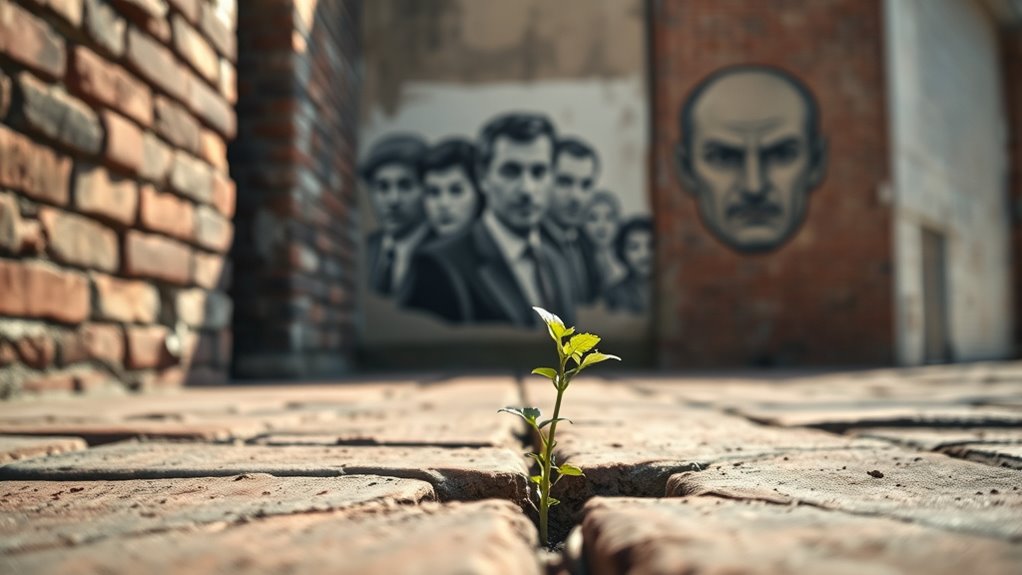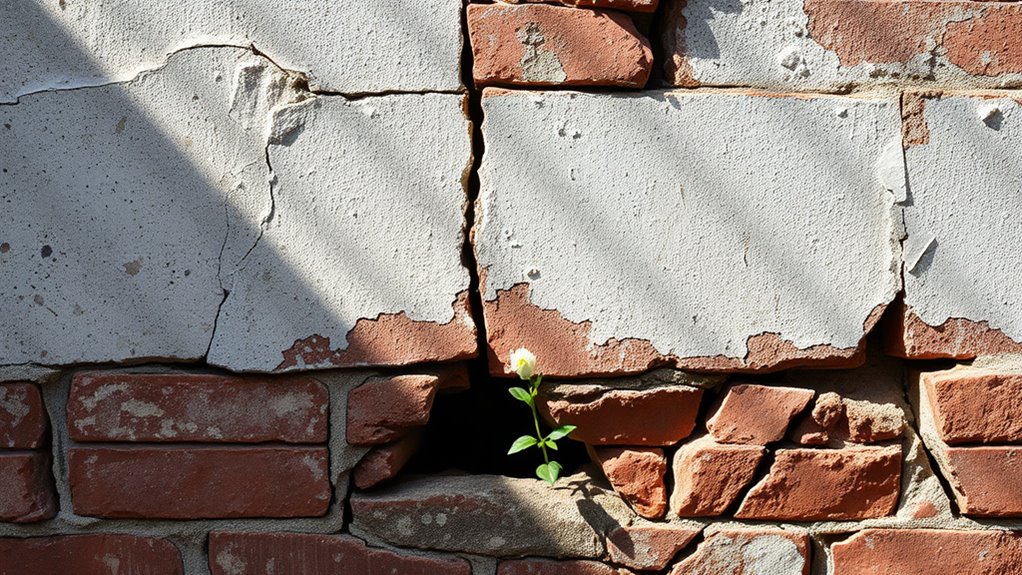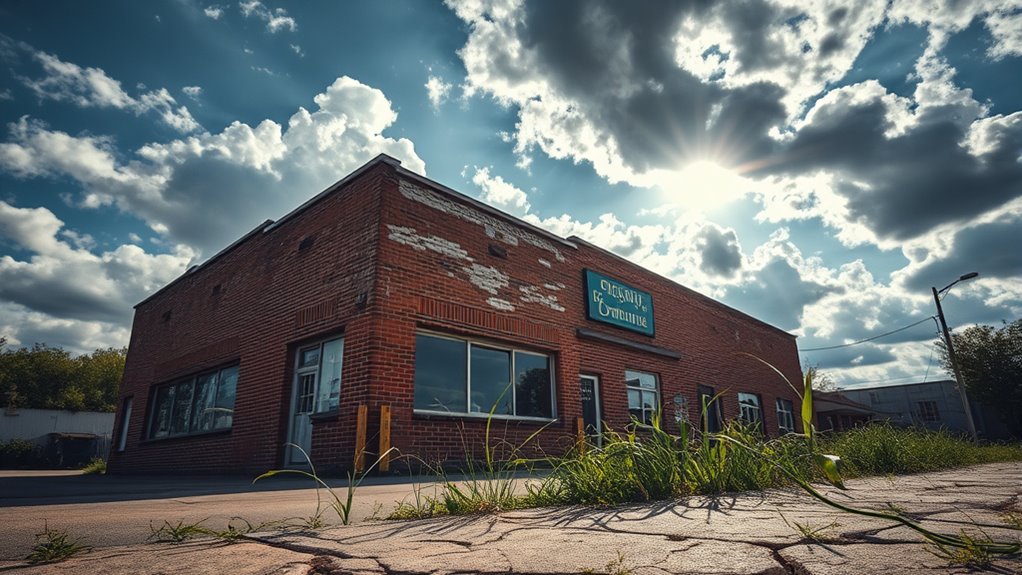Building grit involves nurturing early experiences, developing a growth mindset, and establishing consistent habits that promote resilience. Your environment and support system play essential roles in maintaining persistence and passion over time. Learning from setbacks and reframing failures as opportunities for growth help strengthen emotional resilience. Focusing on meaningful goals and intrinsic motivation fuels long-term perseverance. Stay committed, and you’ll discover how aligning your mindset and actions can transform setbacks into stepping stones for success.
Key Takeaways
- Longitudinal studies show that cultivating a growth mindset and perseverance over time enhances grit development.
- Consistent routines, reflection, and goal-setting are critical for sustaining long-term effort and resilience.
- Supportive environments and community engagement reinforce motivation and emotional resilience essential for grit.
- Embracing failures as learning opportunities fosters emotional regulation and persistence in ongoing pursuits.
- Early experiences, positive reinforcement, and habit formation are key factors influencing sustained grit across life stages.
The Role of Early Experiences in Developing Grit

Early experiences play a crucial role in shaping your capacity for grit. During early childhood, the environment you grow up in and the influence of your parents markedly impact your resilience and perseverance. When parents model determination and provide encouragement, you learn to face challenges with confidence. Positive reinforcement for effort helps you develop a growth mindset, making setbacks feel like opportunities to improve. Conversely, a lack of support or inconsistent guidance can hinder your ability to develop grit. Your early childhood experiences set the foundation for how you approach difficulties later in life. Parental influence, especially in fostering a safe space to explore failures and successes, helps you build the emotional strength necessary for sustained effort over time. These early lessons stay with you as you pursue long-term goals. Developing cultural intelligence during these formative years can further enhance your resilience by enabling better adaptation to diverse social environments.
How Persistence and Passion Interact Over Time

As you develop grit, understanding how persistence and passion work together over time can open greater resilience and achievement. Passion development fuels your motivation, giving you a sense of purpose that sustains effort through challenges. Persistence pathways are the strategies you use to maintain effort, even when progress slows or setbacks occur. Over time, these elements intertwine: passion ignites your desire to pursue goals, while persistence ensures you stay committed through obstacles. As your passion deepens, your persistence strengthens, creating a cycle that propels continuous growth. Recognizing this interaction helps you manage your energy, stay focused, and build resilience. By nurturing both passion and persistence, you develop a sustainable approach that keeps you moving forward, even in the face of adversity. Additionally, understanding the typical hours of operation for various beauty stores can help you plan your visits more efficiently.
The Impact of Support Systems and Environment

Your environment and support systems play a vital role in building grit, as community engagement offers motivation and accountability. Support networks provide encouragement during tough times, making persistence easier. Recognizing how your surroundings influence your resilience can help you harness their full potential. Additionally, understanding the importance of cost and budgeting can aid in creating sustainable environments that foster growth and perseverance.
Community Engagement Benefits
Community engagement plays a crucial role in building resilience and fostering grit because supportive environments provide encouragement, accountability, and shared resources that help you persevere through challenges. When you participate in community activities, you gain access to diverse perspectives and cultural diversity that broaden your understanding and strengthen your adaptability. Engaging with others builds a sense of belonging and shared purpose, which boosts your motivation during tough times. Community participation also creates networks of support, offering practical help and emotional encouragement when you need it most. By immersing yourself in a culturally diverse environment, you develop resilience skills that carry over into other areas of your life. Additionally, active involvement in local conservation efforts can enhance your awareness of biodiversity and foster a deeper connection to the environment, further strengthening your ecosystem awareness. Ultimately, active community involvement nurtures grit by reinforcing your ability to face adversity with confidence and perseverance.
Environmental Influences Matter
Environmental influences substantially shape your ability to develop grit by providing the support systems and settings that encourage persistence. These environmental factors, including societal influences, can either bolster or hinder your resilience. Supportive environments foster motivation and perseverance, while negative surroundings can diminish your grit. For example:
| Environment Type | Societal Influence | Impact on Grit |
|---|---|---|
| Supportive | Community norms | Boosts perseverance |
| Neutral | Cultural expectations | No significant change |
| Unsupportive | Negative stereotypes | Diminishes motivation |
| Resource-rich | Educational access | Enhances resilience |
| Resource-poor | Socioeconomic barriers | Limits persistence |
Understanding how these factors interact helps you navigate and leverage environmental influences to build greater grit. Additionally, the contrast ratio of your environment can influence how you perceive challenges and maintain focus, further affecting your resilience.
Support Networks Strengthen
Support networks play a essential role in strengthening your grit by providing encouragement, guidance, and accountability during challenging times. When you have a strong support system, you’re more likely to persevere through setbacks and stay committed to your goals. Support networks include friends, family, and, importantly, mentorship programs that connect you with experienced individuals who can offer valuable insights and motivation. These relationships create a sense of belonging and resilience, helping you navigate obstacles more effectively. Mentorship programs, in particular, serve as a foundation for building confidence and resilience, reinforcing your determination. By actively engaging with your support networks, you cultivate the mental toughness needed to push forward, even when faced with adversity. Recognizing the importance of peer support can further enhance your endurance and commitment to long-term pursuits.
Learning From Failures: Resilience and Growth

Failing is an inevitable part of growth, but how you respond to setbacks determines your resilience and future success. Embracing failures allows you to practice mindset shifts and emotional regulation, essential for growth. Instead of viewing failures as obstacles, see them as opportunities to learn and adapt. Reflect on what went wrong, adjust your approach, and stay committed. Consider this common scenario:
| Failure Experience | Your Response | Growth Outcome |
|---|---|---|
| Missed a deadline | Analyzed what caused delay | Improved time management |
| Rejected a project | Reframed as feedback | Increased persistence |
| Made a mistake | Practiced emotional regulation | Strengthened resilience |
| Encountered setbacks | Embraced vulnerability | Built emotional resilience |
Additionally, understanding personal growth strategies can help you build the resilience necessary to thrive through challenges.
The Influence of Goals and Personal Motivation

Your goals and personal motivation directly shape your path to success, fueling your persistence and focus along the way. When your goals align with your intrinsic motivation—your genuine interests and values—you’re more likely to stay committed during setbacks. Goal alignment creates a sense of purpose, making challenges feel meaningful rather than burdensome. Intrinsic motivation drives you from within, helping you push through obstacles because you find personal satisfaction in the process. Clear, aligned goals reinforce your grit, encouraging you to persevere even when progress slows. Recognizing the importance of motivation in music creation can inspire you to pursue projects that resonate deeply with your passions, further strengthening your resilience and building a sustainable foundation for long-term achievement.
Practical Strategies for Cultivating Grit Throughout Life

Developing grit isn’t something that happens overnight; it requires deliberate effort and consistent practice. To do this, focus on mindset shifts that emphasize growth, resilience, and perseverance. Recognize setbacks as opportunities to learn rather than failures. Habit formation plays a vital role—set small, achievable goals daily to build momentum and reinforce your commitment. Regularly reflect on your progress and adjust your strategies to stay motivated. Cultivating grit is an ongoing process that benefits from intentional routines and a positive outlook. By consciously shaping your mindset and establishing habits that support persistence, you’ll strengthen your perseverance over time. Remember, building grit is a journey—each effort counts toward developing resilience that lasts a lifetime. Incorporating best practices from proven research can further enhance your ability to stay committed.
Frequently Asked Questions
Can Grit Be Effectively Developed in Adulthood?
You can definitely develop grit in adulthood. Resilience training and goal setting strategies play vital roles in this process. By consistently practicing these techniques, you strengthen your perseverance and passion for long-term goals. While it may take time, focusing on manageable steps helps you build resilience and commitment. So, with intentional effort and the right tools, you can enhance your grit at any age and pursue your goals more effectively.
How Do Cultural Differences Influence Grit Development?
Did you know that cultural norms markedly shape grit development? In some cultures, perseverance is highly valued, boosting motivation factors and supporting long-term goal pursuit. You might find that in collectivist societies, community support enhances grit, while individualist cultures emphasize personal resilience. Your motivation factors are deeply influenced by these cultural differences, affecting how you approach challenges and sustain effort over time. Embracing diverse perspectives can strengthen your grit-building strategies.
Is Grit More Important Than Innate Ability?
You might wonder if grit is more important than innate ability. The talent debate suggests that motivation factors, like perseverance and passion, often matter more for success. While innate ability can give you a head start, your sustained effort and resilience drive long-term achievement. Building grit helps you overcome setbacks, making it a vital factor in reaching your goals beyond just natural talent.
What Role Does Mindset Play in Sustaining Grit Long-Term?
Mindset makes a massive difference in maintaining grit over time. When you adopt a growth mindset, you believe challenges can change you, fueling resilience training and persistence. This positive perspective helps you push through setbacks, stay focused, and sustain effort long-term. With a resilient mindset, you’re more likely to persevere despite obstacles, turning temporary failures into future successes and keeping your grit glowing bright for the long haul.
How Can Organizations Foster Grit Among Employees?
To foster grit among employees, you should implement resilience training to help them develop emotional strength and adaptability. Encourage goal-setting strategies that promote persistence and focus, such as setting clear, achievable objectives and tracking progress. By creating a supportive environment that values effort and resilience, you motivate your team to stay committed and resilient through challenges, ultimately strengthening their grit over the long term.
Conclusion
By embracing these lessons, you’ll open the secret to unstoppable grit—transforming setbacks into unstoppable comebacks and passion into unstoppable force. With every challenge, you’ll build resilience so powerful it could move mountains. Your support system will become an unbreakable fortress, and your goals will ignite a fire so fierce it lights up the universe. Keep cultivating grit, and you’ll discover a strength so extraordinary, it might just bend the fabric of reality itself.









